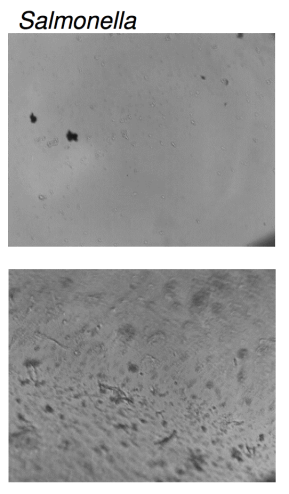Pre-Cut, Bagged Salad May Actually Contribute To Growth Of Salmonella Image courtesy of Scott Akerman
Salads are among the most common sources of foodborne illness, and we’ve repeatedly seen how pre-cut, bagged salad products can harbor ugly pathogens like listeria or salmonella. A new scientific study finds that pre-cutting these leafy vegetables may actually be contributing to the growth of salmonella.
The study — published today by researchers from the University of Leicester in Applied and Environmental Microbiology, a journal of the American Society for Microbiology — found that juices released from cut and damaged leaves can not only significantly encourage the growth of Salmonella enterica, but also enhance the pathogen’s ability to attach to the leaves of the salad and to the salad’s plastic bag container.
In short: The juices released from cut salad leaves may help grow more salmonella that is more difficult to get rid of — to the point where washing the salad will not remove the pathogens.
Refrigeration has been shown to restrict salmonella growth on fresh produce, but the researchers in this study claim that refrigerating pre-cut salad leaves in plastic bags still allows for salmonella to grow faster than it otherwise would.
“These analyses suggest that Salmonella contaminating a bagged salad would be able to use the leaf nutrients leached into the bag water film to promote its proliferation and retention even within a refrigerated environment,” explains the study.
With regard to the salmonella attaching to leaves and to the plastic bags, the researchers found that exposure to the salad liquids aids in the forming of a biofilm that allows the salmonella to cling more durably to surfaces.
And while the typical plastic materials used for the bags — polyethylene terephthalate or polypropylene — didn’t demonstrate any real tendency for salmonella to attach, that changed when the juice from the salad leaves was introduced.
 See the image to the right. At the top, is salmonella on a plastic bag surface without the presence of salad juice. Below that is salmonella on the same type of surface after the introduction of the juice.
See the image to the right. At the top, is salmonella on a plastic bag surface without the presence of salad juice. Below that is salmonella on the same type of surface after the introduction of the juice.
“This suggests the salad bag container could be an important bacterial attachment site,” concludes the study, “even though the salad container has not been factored into considerations of what influences pathogen colonisation or retention.”
This study is just the latest piece of research shining a spotlight on the need for better handling of produce to reduce foodborne illness. In July, researchers from the University of Reading found that salad leaf juices can also help to grow pathogenic E. coli bacteria. Before that, a 2012 review found that pathogens are particularly difficult to get rid of on fresh produce.
Back in 2010, our colleagues at Consumer Reports tested more than 200 bagged salads, and while they didn’t turn up listeria, E. coli, or salmonella, the tests did find presence — sometimes quite high — of bacteria like enterococcus that are indicators of fecal contamination.
Want more consumer news? Visit our parent organization, Consumer Reports, for the latest on scams, recalls, and other consumer issues.

